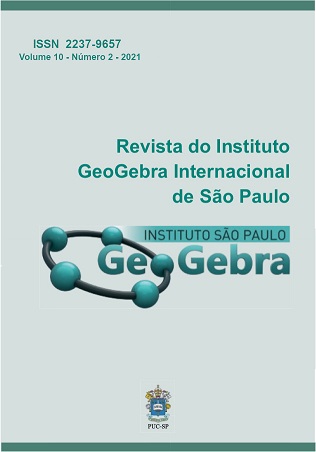The use of GeoGebra to ensure the enrichment of students' mathematical communication: an experience in 7th grade in the Angolan context
DOI:
https://doi.org/10.23925/2237-9657.2021.v10i2p105-128Keywords:
Mathematics Communication, GeometryAbstract
The present work results from a classroom experience, carried out with the seventh-class students at a school located in Bengo province in Angola. In order to promote reflexive dialogue in the construction of concepts associated with the lines in the plane, the students were familiar with GeoGebra, being explored its potentialities. Simultaneously, a qualitative study was developed, analyzing as answers to a questionnaire, the students' work, and the dialogue in the classroom. The focus was on the analysis of the interpretations of the geometric figures performed and the development of communication and mathematical reasoning from the representations of these constructions. The results that showed the students were able to build and consolidate concept associated with plane straight lines, as well as consolidate mathematical communication.
References
ADNYANA, Putu Gede Widhy; SUARSANA, I. Made; SUHARTA, I. Gusti Putu. Multi-Representation Discourse Model and Math Problem Solving Skills of High School Students. Journal of Learning Improvement and Lesson Study, v. 1, n. 1, p. 40-48, 2021.
AMADO, João. Manual de Investigação Qualitativa em Educação 3ª edição. Imprensa da Universidade de Coimbra/Coimbra University Press, 2017.
ARTIGUE, M. (2016). Os desafios do ensino de matemática na educação básica. Paris: UNESCO. 2016.
DOS SANTOS, José Manuel Dos Santos; GOMES, Mariana. Classificação de ângulos através de uma estória em aulas de apoio a alunos com dificuldade de aprendizagem. Revista do Instituto GeoGebra Internacional de São Paulo, v. 10, n. 1, p. 19-48, 2021.
DUVAL, Raymond. Sémiosis et pensée humaine: registres sémiotiques et apprentissages intellectuels. Berne: Peter Lang, 1995.
ESPINOSA, Alfonso Jiménez; ÁVILA, Nury Yolanda Suárez; MENDOZA, Sandra María Galindo. La comunicación: eje en la clase de matemáticas. Práxis & Saber, v. 1, n. 2, p. 173-202, 2010.
FERNANDES, Dárida; FERREIRA, Juliana Vaz Almeida Gomes. As Potencialidades do GeoGebra no 1. º Ciclo do Ensino Básico The Potentialities of GeoGebra in the 1st Cycle of Basic Education. Revista do Instituto GeoGebra Internacional de São Paulo. ISSN 2237-9657, v. 9, n. 2, p. 52-77, 2020.
FREITAS, Maria Teresa Menezes; FIORENTINI, Dario. As possibilidades formativas e investigativas da narrativa em educação matemática. Revista Horizontes, v. 25, n. 1, p. 63-71, 2007.
HENRIQUE, Marcos Paulo; BAIRRAL, Marcelo Almeida. Do bolso para palma das mãos: retas e ângulos com GeoGebra Aplicativo. Revista do Instituto GeoGebra Internacional de São Paulo. ISSN 2237-9657, v. 7, n. 3, p. 49-64, 2018.
JOÃO, Kengana Sebastião André; DISTINTO, David Mafuani. Avaliação Formativa da Comunicação Matemática. Revista Angolana de Extensão Universitária, v. 2, n. 3, 2020.
LACERDA, Alan Gonçalves. O diálogo e o GeoGebra na educação básica: implicações para os jovens futuros professores e sua formação. Revista do Instituto GeoGebra Internacional de São Paulo. ISSN 2237-9657, v. 7, n. 2, p. 29-44, 2018.
MARTIN, W. Gary. Principles and standards for school mathematics. National Council of Teachers of, 2000.
NATIONAL COUNCIL OF TEACHERS OF MATHEMATICS (NCTM). Princípios para a ação: assegurar a todos o sucesso em matemática. Portugal: Associação de Professores de Matemática. 2017.
NAVA, Mario Castillo. ¿Es la comunicación un factor de aprendizaje de las matemáticas?. Revista Iberoamericana de Educación, v. 56, n. 3, p. 1-5, 1911.
OECD, Governing Board. PISA 2021 Mathematics Framework (first draft). 2018. https://www.oecd.org/pisa/pisaproducts/pisa-2021-mathematics-framework-draft.pdf
Partnership for 21st Century Skills. (2014). Framework for 21st century learning. http://www.p21.org/our-work/p21-framework
PONTE, João Pedro da et al. A comunicação nas práticas de jovens professores de Matemática. Revista Portuguesa de Educação, p. 39-74, 2007.
PONTE, João Pedro da. Gestão curricular em Matemática. O professor e o desenvolvimento curricular, p. 11-34, 2005.
PRODANOV, Cleber Cristiano; DE FREITAS, Ernani Cesar. Metodologia do trabalho científico: métodos e técnicas da pesquisa e do trabalho acadêmico-2ª Edição. Editora Feevale, 2013.
SEMANA, Sílvia. A comunicação oral na promoção da autorregulação da aprendizagem dos alunos em Matemática. Educação e Matemática, n. 149, p. 9-12, 2018.
VALE, Isabel. Algumas Notas sobre a Investigação Qualitativa em Educação Matemática - O Estudo de Caso Isabel Vale, Revista da Escola Superior de Educação de Viana do Castelo. 171-202.
VIDEIRA, Ana Correia. A comunicação matemática escrita na resolução de tarefas e o seu efeito na concretização do teste intermédio: um estudo com alunos do 11º ano de escolaridade do curso de ciências e tecnologias. 2013. Tese de Doutorado.
VYGOTSKY, Lev Semenovich; COLE, Michael. Mind in society: Development of higher psychological processes. Harvard university press, 1978.
VYGOTSKY, Lev Semenovich. El desarrollo de los procesos psicológicos superiores. Barcelona, España: Grijalbo. 1998.
Downloads
Published
How to Cite
Issue
Section
License
Copyright (c) 2021 Revista do Instituto GeoGebra Internacional de São Paulo

This work is licensed under a Creative Commons Attribution 4.0 International License.
Submission, processing, and publication of articles sent to the journal and registration of the DOI at Crossref is free of charge.
Authors retain their copyright and grant the journal the right of first publication of their article, which is simultaneously licensed under a Creative Commons - Attribution 4.0 International license CC BY that allows others to share the article by acknowledging its authorship and initial publication by the journal.
The GeoGebra journal encourages its authors to register their work with information and communication management systems aimed at researchers, such as Academia.edu, Mendeley, ResearchGate, etc.


 10.23925
10.23925
